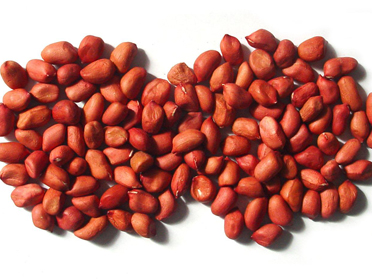Peanuts

Convenient, tasty, healthy, and affordable: four words not often used together. But packed inside these tiny kernels, you’ll find all of that and more! The peanut, or groundnut, is a species in the legume or "bean" family. The peanut was probably first domesticated and cultivated in the valleys of Paraguay. It is an annual herbaceous plant growing 30 to 50 cm tall..
Peanuts are Full of Nutrition
Experts recommend more plant-centered eating, including plant source of protein like peanuts. Not only tasty and versatile, peanuts can help you get more nutrition in every bite, giving you more energy to live a vibrant life. Some people worry about the fat in peanuts, but it’s important to remember that most of the fat is good fat – 12 grams of the 14 grams total fat are unsaturated – the kind that we should eat more often. As part of a balanced diet, peanuts and peanut butter provide great tasting nutrition.
Protein
Most often thought of as a nutrient in animal foods like meat, eggs, and dairy, protein is also in plant-based foods. Eating a variety of protein sources, including plant-based foods like peanuts, can help provide needed nutrients and reduce the amount of cholesterol (which experts recommend we eat less of) in the diet. For vegetarians, it’s importantto eat a variety of plant-based protein to help provide all essential amino acids, since most vegetable sources are deficient in one or more.
With seven grams per ounce, peanuts have more protein than any nut. Protein is essential for muscle growth and maintenance.
Convenient, tasty, healthy, and affordable: four words not often used together. But packed inside these tiny kernels, you’ll find all of that and more!.
Vitamins, Minerals and More Peanuts are a good source of (≥10%):
Vitamin E: Vitamin E is a dietary antioxidant that helps to protect cells from oxidative stress, a normal, yet damaging, physiological process.
Magnesium: Magnesium is important for muscle function including the heart, enzyme function and energy production.
Folate: Folate is needed for cell division, which means that adequate folate intake is especially important during pregnancy and childhood when tissues are growing rapidly.
Copper: Copper is essential for red blood cell formation and for healthy blood vessels, nerves, immune system and bones.
Phosphorus:Phosphorus is important for the formation of teeth and bones, cell growth and muscle function, as well as helping the body use vitamins to create energy for cells.
Fiber (9%): Fiber adds bulk to your diet and helps you feel full longer, while aiding in digestion. In fact, the Dietary Guidelines for Americans urge Americans to consume more fiber-rich plant foods for better health. Peanuts are an excellent source of (≥20%).
Niacin: Niacin is an important B vitamin that helps to convert food to energy, aids with the digestive and nervous system, and helps the skin.
- Manganese: Manganese is important for processing cholesterol, and nutrients like carbohydrates and protein.
Peanuts also contain other nutrients, including:
Arginine
Phytosterols, such as beta-sisterol
Potassium
Resveratrol
Selenium
Zinc







